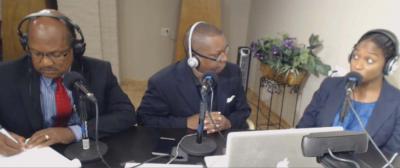September 16, 2015
 City Councillor Charles Yancey and Andrea Campbell squared off on Tuesday at Boston Praise Radio. Moderator Kevin Peterson is at middle. Image courtesy Boston Praise Radio
City Councillor Charles Yancey and Andrea Campbell squared off on Tuesday at Boston Praise Radio. Moderator Kevin Peterson is at middle. Image courtesy Boston Praise Radio
In their first public debate on Tuesday, District 4 City Council candidates Charles Yancey and Andrea Campbell addressed the low preliminary turnout, pitched potential voters, and tackled allegations of a smear campaign being conducted by the Yancey camp, which the incumbent councillor denied.
Campbell is fresh off a sizable preliminary victory on an election day with its embarrassingly low turnout. Only seven percent of voters showed up to the polls on Sept. 8, and 1,982 (57.92 percent) of them voted for Campbell. Yancey, with 32 years on the council, finished second, claiming 1,159 votes (33.87 percent). The result teed them up for the runoff in November.
Although pleased with her victory, at the debate, which was hosted by Boston Praise Radio, Campbell said that she was “saddened by the turnout numbers.” Re-emphasizing her commitment to accessibility, she said she hoped to increase civic engagement but did not blame the voters in a district with historically low turnouts.
Yancey was less diplomatic. “Last Tuesday was a very dismal day in the city of Boston,” he said, decrying his second-place finish and the 93 percent of the electorate who chose not to vote. Many may not have known it was an election day, he said, or stayed home for fear of heat exhaustion during the scorching day. “I ask the people who stayed home, can we afford to repeat that dismal performance?”
In a series of questions posed to both candidates by host Kevin Peterson, Campbell and Yancey spoke largely in agreement. They concurred on the importance of diversity in Boston Public Schools, which are federally ordered to employ at least 25 percent black teachers. Yancey said the 25 percent goal was not high enough, and proposed reinstating an elected school committee.
Asked to address annual violence around the time of the Carribean Carnival, both candidates expressed support for the celebration. Peterson said Superintendent-In-Chief William Gross called the 24 hours surrounding the festival the most dangerous time in Boston. Yancey suggested that Gross misspoke, and Campbell called the statement “unfair.”
Tackling the violence in certain sections of the city was a challenge, both candidates said. Campbell said she plans to maintain a campaign office for accessibility purposes and host regular coffee hours, some in locations considered a “hot zone or hot spot.”
Given the chance to ask each other questions, the tone became more contentious. Campbell said she has heard complaints that the Yancey campaign has engaged in negative character attacks, specifically regarding her not being from the neighborhood. Yancey said he “categorically reject[s]” any accusations of his team engaging in “any kind of character assassination.“ He said his record is clear, and “to suggest that somehow I have to resort to negative tactics belies the fact that I’ve won 16 times without any negative tactics.”
He said the district is small enough and manageable enough that one does not need to raise $100,000 to connect with voters. As of Sept. 14, the Campbell campaign had raised $133,517, according to reports filed with the Massachusetts Office of Campaign & Political Finance.
Yancey has emphasized his track record in office as the strongest reason to re-elect him, specifically his work on the B-3 police station, the Gallivan Community Center, the Mildred Avenue Community Center, and the annual book fair, among others. “I have the experience to make things happen in City Hall,” he said.
Reacting in part to Campbell’s public airing of her personal struggles, Yancey said that he, too has a family history in the neighborhood. He became more pointed when discussing candidate qualifications, asking, “what specifically have you gotten done in the district before you decided to knock on thousands of doors and campaign?”
Responding first with a reference to her story – which includes the loss of both parents, a grandmother’s struggles with alcoholism, the death of her twin brother, and a childhood in and out of foster homes and on public assistance – Campbell said she chooses to “share pieces that I think resonate, that were painful and traumatic for me.”
Expanding on the resources that were made available to her through public schools and community support, she said, “If I did not have those things, I would not be the ‘success story’ I am today.” She said she draws on that history “as a model of what a young person needs, what a family needs to reach their God-given potential.”
Specifically, she said, she has been an attorney supporting disadvantaged and minority youths, a leader within the community, and has worked with the City of Boston, including reviewing city council proposals while assisting Governor Deval Patrick’s office. “I have engaged with the city on many different levels,” she said. “There are skills which are clearly transferable.”
Highlighted forcefully in the short debate is the crux of Campbell’s and Yancey’s differences. The veteran councillor promises to continue to push for what he feels is best for his district, including police body cameras and a new school. First-time candidate Campbell promises to listen, to be accessible, and to let the community guide her objectives.
As the debate closed, Campbell said she was game for another one later on; Yancey hesitated, allowing that he was open to considering it.



